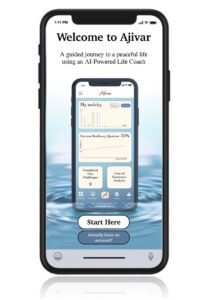Ajivar is a University tool for success


One of the university’s primary roles is to provide in a way that results in quality education to students.


What Tools Do You Have That Will Help You Succeed in College
Quality education can be provided, however, a student may not be prepared to receive it regardless of their capacity to learn and previous performance. Transitions, being away from support systems, and entering a new phase in life can be an adjustment that takes time for students.
Universities have grown in their understanding of their ability to increase that likelihood for success. As Universities assess their success in supporting students they measure retention and graduation rates, time to degree completion, academic performance, and track educational goals. These metrics allow the University to examine how their supports and resources are impacting students as they navigate their program.
But are they keeping track of students’ resiliency and emotional intelligence? According to American College Health Association, a staggering 87% of college students felt overwhelmed by what they have to accomplish and over 65% felt overwhelmed by anxiety. Being away from home for the first time, students are dealing with more stress than they might have experienced in their lives.
Acute and episodic stress have temporary physical symptoms such as headaches, stomach and back pain, and increased heart rate. These issues often don’t lead to long-term health issues because they are not perpetuated. It is during this time of acute stress that universities want to intervene and provide support.
Stress is inevitable given the myriad of demands. How students handle that stress varies greatly, and is usually determined by their level of resiliency and emotional intelligence. Each student enters college with their own set of skills for coping with stress.
By the time students enter college, they have experienced life enough to know how to get through some adversity; however, college typically introduces a new set of challenges. College requires an increased pace, set of organizational skills and focus so most students need some help adjusting; especially without the previous support, they used to rely on.
And it is not just the beginning of college that can be stressful. In all phases of a student’s time within a University, there are potentials for stress. Stress produces anxiety and with anxiety comes the stream of thoughts with one uncertain question after another. Will I know anyone in class? What will my schedule look like? Will I like my dorm room? Will I like my roommate? Will I get along with my professors? Will I make good grades?
These are just a small sampling of self-talk. As the semester goes on, the questions of self-doubt evolve and continue. Most of these questions individually produce anxiety yet considering them all at once may be overwhelming. Tasks and assignments that should take a few hours take all day as self-doubt, overthinking, and uncertainty prevail.
Within the University, there are advisors that can help students determine the right amount of classes to take within a semester. Additionally, many universities are building academic success centers and wellness centers as additional health resources for students.
Academic success centers can respond to acute and episodic stress giving relief; whereas wellness centers ensure the body is moving stress outside and not accumulating leading to health complications or other mental health crises. To receive that help, however, students need to be able to identify they are stressed. Since stress is greatly impacted by our thoughts students need to learn how to determine which thoughts to listen to for action and which thoughts to be aware of so that they can let them go.
This requires emotional intelligence, which Ajivar helps develop. Ajivar’s daily conversations with your guide help you tune in to your body allowing your mind to discover more accurately what you are feeling and thinking. As you begin to cultivate the skill of emotional intelligence, your self-efficacy will increase.
You gain confidence in your ability to know how you are feeling and how it is related to what you are thinking. This understanding allows you to decide if the way you are thinking and feeling is serving your highest self or if you need to shift. By utilizing the mindfulness videos, Ooz challenges, and journaling in Ajivar your self-awareness increases.
As students use these tools, their brain shifts into coherence helping them to make informed decisions for their higher good. Once their thinking is more clear, it will be easier to get connected with other resources at the university that can help depending on their needs. For example, if math is a requirement for your degree, some universities have academic success centers where students can get tutoring.
Not all students can receive material in traditional ways so having someone spend either a small group or 1:1 time to answer this student’s specific questions is important. Tutoring is a tool for professors to ensure their students are keeping up in the class. Success centers can also help when the realization hits that their major is the wrong one and they want to make a change.
This can be a stressful time for students as they pivot; thus, having someone who knows how to navigate this is important in keeping students engaged. Success centers make this transition easier by giving students options for changing, assisting with details and ideally reassuring them. Sometimes the stress isn’t academic but rather something going on in their personal lives, such as depression, family/relationship problems, illness, etc..
When acute and episodic stress builds and isn’t recognized or attended to, it inevitably affects performance. To perform at our best, we must feel well physically, mentally and emotionally. Wellness centers provide health services for the body and mind to ensure students receive the integrative healthcare they need.
In addition to wellness center services that address existing disease, they also help prevent disease altogether, doing daily prevention, strengthening the mind and body. As stress hormones like cortisol, adrenaline, and norepinephrine flood the body due to ongoing stress it causes the brain to be incoherent, meaning it isn’t functioning at its best for critical thinking.
Ajivar’s mindfulness videos can help students calm their stressed, incoherent brains in a short period of time. But to benefit from these videos, it is imperative to have the emotional intelligence to recognize that something is off in order to utilize these videos when in need.
This takes time and practice, once achieved we can bounce back from most stressors by knowing what is happening within our body and what we might need in the moment. Students are benefiting across campuses as they engage in Ajivar. As Ajivar increases self-awareness and emotional intelligence, students often recognize the need to act on realizations that become apparent.
This is where academic success centers and wellness centers become important resources aiding students in becoming their strongest, most resilient selves. Wellness centers are always critical companions alongside Ajivar as stress hormones impact the physical body in addition to the mind.
Both the academic and self-care aspects of a student’s toolbox need to be functioning well so they can truly be themselves and achieve the success they were destined for. College is for most people an amazing experience! There are predominantly positive experiences, social relationships, and opportunities.
To have a positive outlook when things are going well is easy. To remember this in stressful times is more of a challenge. Ajivar’s journal feature helps students track when they feel stressed, providing them a tool that reveals ideas from their thoughts that leads to activities that alleviate stress.
Ajivar’s AI helps tease out and give insights to the students regarding emotions behind their journal entries and therefore increase self-awareness. When you are able to decrease stress, you want to make a clear connection between what actions helped you feel better and what didn’t.
Those actions that worked will become part of students’ individualized wellness toolkit in the future. When stressful events happen, they will be able to look back at what has worked in the past to decrease anxiety. With practice, those lists of what worked will eventually be instinctual, until then Ajivar is there as a reminder. As students begin to be able to calm their stressed brain, situations will look different.
Frustration, fear, and uncertainty turn into optimism, competence, and determination. The very same situation that a stressed mind finds impossible may seem completely different when the brain is in a restful, coherent state.
A stressed brain can be deceiving, telling us things that just aren’t true. When the brain is coherent, life begins to look more manageable. This, in turn, keeps students engaged, looking for solutions, and able to perform the daily tasks needed to complete their degree.
Let Ajivar be one of the tools that helps your students believe in their ability to handle whatever comes at them, so they can achieve their goals!
Related Posts


The Power of Mindfulness
Emerging research has shown incredible benefits of practicing mindfulness on a daily basis, particularly meditation.


What are Posimations?
Posimations, a cool term we invented at Ajivar, are really an abbreviation of “positive affirmations.”


We change the world by increasing Emotional Intelligence
~ Self-awareness is key ~Emotional intelligence (EI), is a competency skill that covers many areas


Accepting your mind chatter
You are fully in charge! If experts say that we have about 70,000 thoughts in